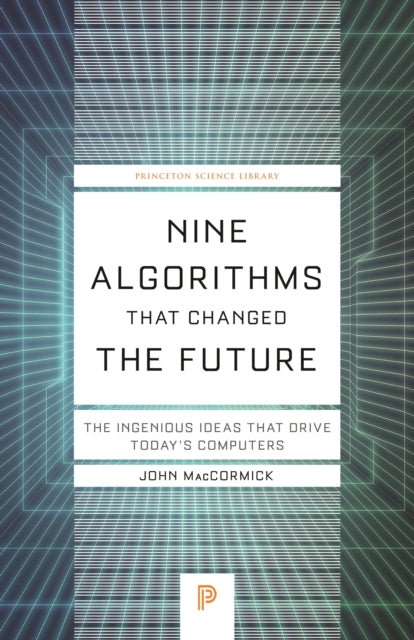John MacCormick
Nine Algorithms That Changed the Future: The Ingenious Ideas That Drive Today's Computers
Nine Algorithms That Changed the Future: The Ingenious Ideas That Drive Today's Computers
YOU SAVE £3.25
- Condition: Brand new
- UK Delivery times: Usually arrives within 2 - 3 working days
- UK Shipping: Fee starts at £2.39. Subject to product weight & dimension
Bulk ordering. Want 15 or more copies? Get a personalised quote and bigger discounts. Learn more about bulk orders.
Couldn't load pickup availability
- More about Nine Algorithms That Changed the Future: The Ingenious Ideas That Drive Today's Computers
Nine revolutionary algorithms that power our computers and smartphones, such as web search, Facebook uploads, public-key cryptography, and digital signatures, are explained in John MacCormick's book in language anyone can understand.
Format: Paperback / softback
Length: 232 pages
Publication date: 15 September 2020
Publisher: Princeton University Press
Computers and smartphones are powered by a remarkable array of revolutionary algorithms. These algorithms enable us to perform astonishing feats, such as conducting a web search that retrieves relevant information from a vast haystack, uploading photos to Facebook without any errors, and transmitting secret information securely using public-key cryptography and digital signatures.
The underlying mechanisms behind these tasks are complex and intricate, but John MacCormick simplifies them using vivid examples and straightforward language. In his book, "Nine Algorithms That Power Our Computers and Smartphones," MacCormick explains the fundamental tricks behind nine computer algorithms that are essential to modern computing.
The first algorithm is the search algorithm, which is used to find specific information in a large dataset. MacCormick explains how this algorithm works by dividing the dataset into smaller chunks and then searching for a specific pattern within each chunk. The second algorithm is the sorting algorithm, which is used to organize data in a specific order. MacCormick demonstrates how this algorithm works by comparing two elements and deciding which one comes first based on a set of rules.
The third algorithm is the hashing algorithm, which is used to create a unique identifier for a piece of data. MacCormick explains how this algorithm works by taking a piece of data and transforming it into a fixed-length string of characters. The fourth algorithm is the encryption algorithm, which is used to protect sensitive information from unauthorized access. MacCormick explains how this algorithm works by transforming data into a code that can only be decoded by a specific key.
The fifth algorithm is the decryption algorithm, which is used to reverse the process of encryption and restore the original data. MacCormick explains how this algorithm works by using the same key that was used to encrypt the data. The sixth algorithm is the compression algorithm, which is used to reduce the size of data by removing unnecessary information. MacCormick explains how this algorithm works by identifying patterns in the data and replacing them with shorter codes.
The seventh algorithm is the decompression algorithm, which is used to reverse the process of compression and restore the original data. MacCormick explains how this algorithm works by identifying the patterns used in compression and replacing them with the original data. The eighth algorithm is the machine learning algorithm, which is used to train computers to make predictions and decisions based on data. MacCormick explains how this algorithm works by analyzing data and identifying patterns that can be used to make predictions.
The ninth algorithm is the neural network algorithm, which is used to simulate the workings of the human brain. MacCormick explains how this algorithm works by training a network of artificial neurons to recognize patterns in data.
In conclusion, "Nine Algorithms That Power Our Computers and Smartphones" is a valuable resource for anyone who wants to understand the fundamental tricks behind nine computer algorithms that power our modern computing. John MacCormick's clear and concise explanations make complex concepts accessible to anyone, and his vivid examples help to bring the algorithms to life. Whether you are a computer scientist, a software engineer, or just someone who is curious about how computers work, this book is a must-read.
Weight: 250g
Dimension: 141 x 215 x 19 (mm)
ISBN-13: 9780691209067
This item can be found in:
UK and International shipping information
UK and International shipping information
UK Delivery and returns information:
- Delivery within 2 - 3 days when ordering in the UK.
- Shipping fee for UK customers from £2.39. Fully tracked shipping service available.
- Returns policy: Return within 30 days of receipt for full refund.
International deliveries:
Shulph Ink now ships to Australia, Belgium, Canada, France, Germany, Ireland, Italy, India, Luxembourg Saudi Arabia, Singapore, Spain, Netherlands, New Zealand, United Arab Emirates, United States of America.
- Delivery times: within 5 - 10 days for international orders.
- Shipping fee: charges vary for overseas orders. Only tracked services are available for most international orders. Some countries have untracked shipping options.
- Customs charges: If ordering to addresses outside the United Kingdom, you may or may not incur additional customs and duties fees during local delivery.


